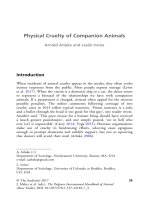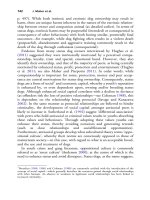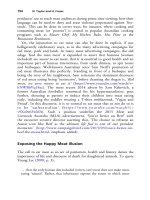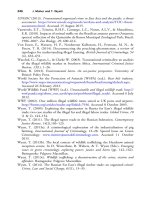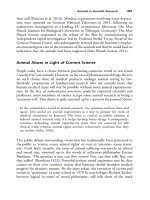The palgrave international handbook of a 110
Bạn đang xem bản rút gọn của tài liệu. Xem và tải ngay bản đầy đủ của tài liệu tại đây (36.81 KB, 1 trang )
100
A. Nurse
2. Was the suffering necessary; which in this case means there was no
reasonably practicable measure by which it could be terminated or alleviated? (Answer: no)
3. Would a reasonably caring and reasonably competent owner have made
the same omission? (Answer: no) (Radford 2001, p. 253)
The objective test applied under (then) legislation relates to the potential
for neglect to be avoided and both the ‘knowledge’ of an offender of the
consequence of their actions and the ‘intent’ of the offender; that is,
whether a competent and suitably caring non-human companion owner
would make the same mistake of not seeking medical assistance. However,
with the additional onus to provide a good standard of animal welfare
contained within the Animal Welfare Act 2006, neglect is now contextualised as abuse, inextricably linked both to the concept of unnecessary
suffering, and failure to comply with the positive obligation that now exists
to provide for effective animal welfare.6 Current UK law is thus arguably
positive and proactive rather than negative and reactive. Nurse and Ryland
(2014, 2013) contend that this is an important change in the law, of
importance to those with non-human companions who are now responsible
for ensuring that their companion’s needs are properly considered in a way
that effectively gives non-human companions legal protection from being
kept in unsuitable conditions. While non-human companions such as cats
and dogs technically remain ‘property’ as outlined earlier in this chapter,
UK law now requires their individual needs to be considered and so anybody wishing to share their home with non-human companions need to
have an awareness of their companion’s individual characteristics. Failure to
do so and neglect, whether by deliberate or accidental omission, now clearly
constitutes abuse contextualised as failure to meet UK law requirement to
provide good, individualised standards of animal welfare.
6
See also R (on the application of Gray and another) v Aylesbury Crown Court [2013] EWHC 500
(Admin) where horse trader Gray argued that Sections 4 and 9 of the Animal Welfare Act 2006 Act
required either actual knowledge or a form of constructive knowledge that an animal was showing signs
of unnecessary suffering, and that negligence was not sufficient for him to be guilty of the alleged
suffering. The court disagreed pointing out that section 4(1)(b) of the 2006 Act clearly aimed to impose
criminal liability for unnecessary suffering caused to an animal either by an act or omission which the
person responsible either had known or should have known was likely to cause unnecessary suffering
whether by negligent act or omission. The court also pointed out that section 9(1) of the Act sets an
objective standard of care which a person responsible for an animal is required to provide. This being the
case, the distinction between Section 4 and 9 is whether the animal had suffered unnecessarily, not the
mental state of the person concerned.
